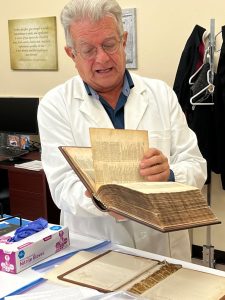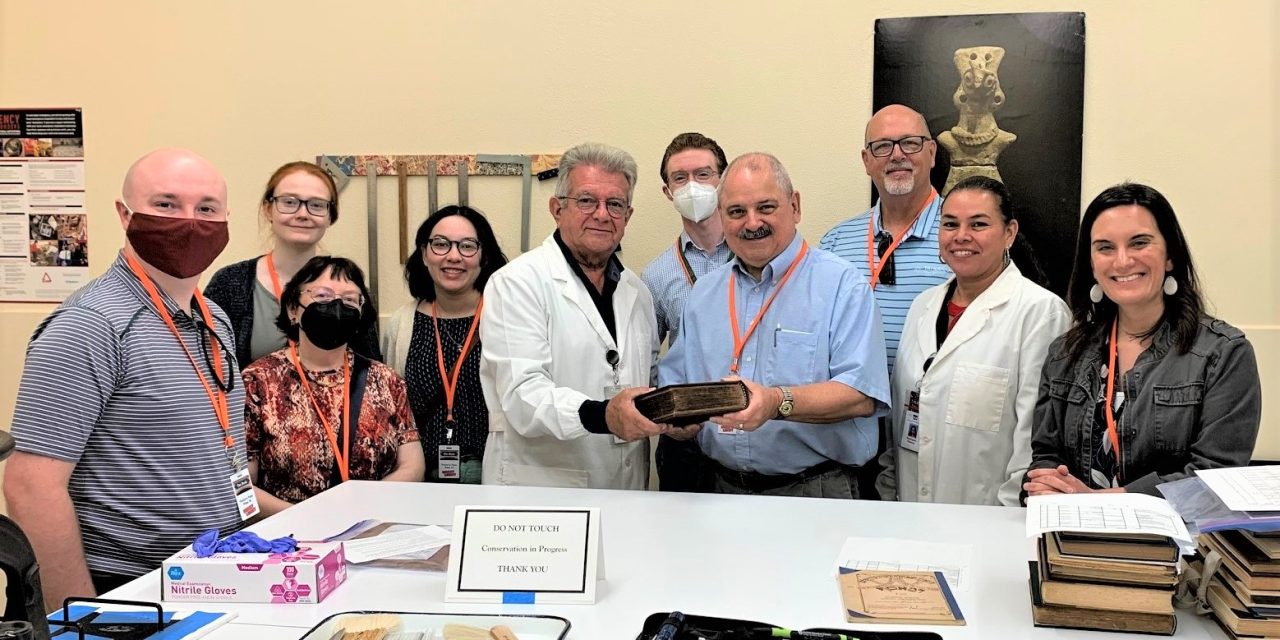Above: Oklahoma Baptists’ Historical Secretary Bob Nigh, center right, accepts delivery of the 1613 King James “He” Bible from Francisco Rodriguez, master conservator with the Museum of the Bible (MOB) in Oklahoma City. Others present for the Aug. 2 ceremony included, front row from left, Joshua Mackey, OBU Mabee Learning Center (MLC) archivist; MLC staff member Denise Jett; MOB conservator Patricia Rodriguez, and Julie Rankin, MLC director of library services. Back row, from left, are MLC library staffers Sarah Stevens and Charles Ackerly and Andy Latta, chairman of the Oklahoma Baptist Historical Commission and minister of music and finance administration at Tahlequah, First.
Conservators recently completed the work of repairing and restoring a 1613 King James Version (KJV) “He” Bible recently donated to the J.M. and Helen Gaskin Baptist Historical Library and Archives at Oklahoma Baptist University (OBU) by members of Oklahoma City, Shields Blvd. Officials with the Mabee Learning Center at OBU contracted with experts at the Museum of the Bible in Oklahoma City to perform the restoration.

Francisco Rodriguez, master conservator with the Museum of the Bible in Oklahoma City, discusses the details of the project to restore the Bible.
Bob Nigh, Oklahoma Baptists’ historical secretary and director of history, joined with Andy Latta, chairman of the Oklahoma Baptist Historical Commission (OBHC); Julie Rankin, OBU director of library services; Joshua Mackey, OBU archivist; and other OBU representatives to pick up the historic book on Aug. 3, 2022.
Mackey presented his findings about the restoration in a “Stewardship and Exhibition Report: 1613 Authorized King James Version “He” Bible,” to the members of the OBHC during their Oct. 3, 2022 semi-annual meeting at OBU.
“Over the course of the last year,” Mackey wrote, “conservators carried out mold remediation, unbound the pages, cleaned centuries of grime off the Bible page by page and rebound it using the tools and methods accurate to the early 17th Century, when it was originally printed. The result is a faithfully preserved, original King James Bible that has been saved for posterity.
“The rarity of this Bible, the craftsmanship in its reconstruction and its value to Oklahoma Baptists raise the stakes for proper stewardship and display,” Mackey continued. “The conservators have provided clear instructions on caring for the Bible. Those directions will have implications on both wise stewardship of it and how we choose to display it. Additionally, ongoing discussions within the university surrounding the maintenance and use of the Mabee Learning Center, and current realities surrounding the facility must be considered.”
Mackey’s report is broken down into three components. Part one explores the history of the Bible’s original production, discovery by the Historical Commission, and preservation work. Part two centers around the directions given to the Mabee Learning Center by the Museum of the Bible on proper care and exhibition for the “He” Bible. Part three explains the current state of the library, short-, medium-, and long-term facility projections, and challenges that currently exist with exhibiting the Bible in this space.
The report concludes with recommendations for storage and display at OBU, while presenting other options, including possible short-term loan to another institution such as the nearby Mabee-Gerrer Museum of Art in Shawnee.
“Thank you to the Historical Commission for entrusting the library staff with this remarkable example of God’s Word,” Mackey said. “I pray that this report guides the commission in decision-making and stressing the importance of this Bible to our brothers and sisters across the denomination. It is not every day that such a rare treasure makes itself known to us!”
After receiving Mackey’s report and discussion about its contents, the OBHC formed a sub-committee to study his findings and recommendations further and make a report to the OBHC.
The “Great He Bible,” refers to a typographical error in the third chapter of the Old Testament book of Ruth, verse 15, which uses the incorrect pronoun “he,” instead of the correct pronoun “she.”
The actual text reads: “he (Referring to Boaz) measured sixe (six) measures of barley and laide (laid) it on her; and he went into the citie (city).” The correct text should read “and she went into the citie.” The Bible’s title page shows that it contains “the Old Testament and the New: Newly translated out of the original tongues: and with the former translations diligently compared and revised, by his majesties special commandment. Imprinted at London by Robert Barker, printer to the king’s most excellent majestie. Anno 1613.”
Barker was one of three printers—along with Bonham Norton and John Bill—authorized to print the 1611 King James Bible, a task that actually took three years to complete.
On Oct. 11, 2020, the Bible was donated to the Gaskin Baptist Archives by members of Oklahoma City, Shields Boulevard. Pastor Gary Bostwick, said the rare Bible was displayed in a hallway of the church, and the decision was made to donate the Bible to the archives for proper restoration and care.
Accompanying the Bible was a 1973 appraisal from an antique collector in Oklahoma City, which identified it as a 1613 copy of the King James Bible. The Bible’s provenance stems from David Sprague from Oklahoma City, and it was previously owned by W.A. Stewart of Pittsburgh Pa.
“Its publication date alone would make it notable,” Mackey said. “The first Authorized King James Bible was published in 1611, while King James I reigned in England from the Union of the Crowns in 1603 to 1625. This means that not only was this particular Bible among the first copies of the original KJV, but it also is contemporary to the king who authorized its translation and publication. It is a remarkable piece of history and a testament to both the craftsmanship of those early printers and the endurance of God’s Word.”
During the restoration process, conservators Francisco and Patricia Rodriguez discovered evidence of mold, which required remediation. That involved exposing the Bible to temperatures and humidity low enough to render existing mold spores inactive and dormant. The conservators provided the following guidelines for care when we retrieved the Bible:
- Keep the humidity and temperature moderate and steady so the spores remain dormant (below 70° F and below 60 percent relative humidity) and monitor to ensure the space is remaining within safe levels.
- Maintain good air circulation in collection storage areas and monitor for stagnant pockets within a space.
- Do not store collections in known damp areas or those areas prone to leaks or floods.
- Keep areas where collections are stored and used as clean as possible. Dust and dirt are a source of spores, both active and dormant, so housing collections in protective enclosures whenever possible helps keep them free of dust. To also keep dust and spore levels low keep windows closed.
- Isolate incoming collections to check for mold.
- Change HVAC (heating ventilating, and air-conditioning) filters according to manufacturer’s recommendations and/or switch to HEPA filters.
Taken together, the conservator’s guidelines highlight the importance of closely controlling and monitoring the conditions in which the Bible is stored and displayed.
“With the above considerations for care and stewardship in mind, displaying the Bible brings with it a few challenges,” Mackey said. “Specifically, protecting the Bible from UV radiation, temperature fluctuations, and humidity will be critical in extending its life, ensuring that it will continue to endure for future generations.
“UV light is perhaps the most challenging element to avoid, as both fluorescent office lighting and natural light are a hazard. The more light the Bible is exposed to, the more frequently its pages will need to be turned to prevent any individual page from fading. Spaces with lots of natural light from windows, such as the Mabee Learning Center lobby, are too great a preservation concern for long-term display.
“We will need to find a location in the library or elsewhere where lighting can be more closely controlled. A dimly lit location with space to install canned lighting would be ideal, since we can direct the light and select bulbs that match the lumens needed to follow the conservator’s recommendations for maximum light exposure.”





